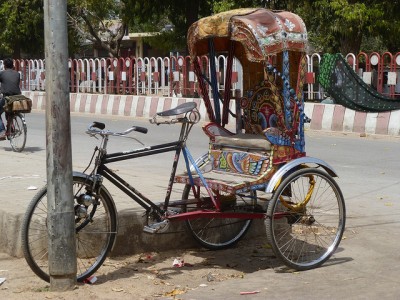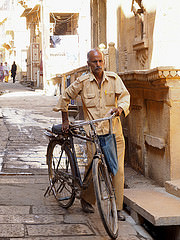by Pravin Vemuri
In 1992, in the third week of April, a few hours after we had left from Mumbai on the Konark express, the cyclone swept in from the Bay of Bengal, skirted around the edge of Chennai and hit costal Andhra right in its mouth. We were on our way to Tenali – the town of my father’s birth and the locus of the eye of the story.
Sometime after the dark, the train was rerouted to go through Madhya Pradesh and Orissa rather than Secundarabad to escape the complete shutdown of the south eastern railway corridor. If we had to get to Tenali on this train, we were told to alight at Vizag and wait for a connection.
Instead, based on some seat-of-the-pants judgements, we got off at Raipur and thereafter changed two passenger trains to cut through to our final destination. I don’t think my parents would have managed to do so with two sub-ten kids and forty kilos of baggage, if not for progressive decentralization they had implemented very early on. My sister and I had our own luggage, our own money and even our own identity cards that my father got us to make the summer before. I was put in charge of the front wing as we ran with our bags from one platform to the next, screaming to ensure we were heard and accounted for – mom and me in the front and dad and my younger sister at the back.
When we arrived in Tenali, way past daylight, there was a storm raging and the rain was so thick, you couldn’t see beyond a foot. We didn’t know at the time but the cyclone had claimed over a hundred lives in the Krishna valley in the thirty hours we had spent on different trains. It had eased out that morning from Tenali and we had ridden into its tail. Wind speeds were in the range of 100 kmph hours before we had arrived and had only abated slightly. The asbestos roof of the station had been ripped off. When we came out, we found it lying on the other side of its tiny bicycle stand, shapeless like it had been kneaded. “Tenali”, the board stuck next to the station announced in three languages with statistics on its area, population, languages and a small map of its location on the Andhra coast.
Tenali is one of the oldest towns in India; its old houses have verandas made entirely of wood and its gutters are inhabited by pigs which grunt every time you stop paying attention. It’s one of the few places that I have visited where the primary mode of transport is cycle rickshaws.
There was only one rickshaw outside the station that night. The rickshawwala said he could take all four of us with our luggage. I think we – all of us and our bags – must have weighed 200 kg. He couldn’t have claimed a gram over 50 and his only protection from the rain was the headgear he had fashioned out of straw. There was nothing else or no one else around. So the kids went onto the laps and the parents covered our heads with towels and held them with their hands. The rickshaw had some protection for the passengers in the form of a fragile overhead sun-cover but the cyclist was open wide to the elements. It was hard rain, it hit like being pelted with stones. It could have pummelled one unconscious. My mother kept asking the rickshawwala to stop to catch his breath but the man didn’t relent. I presume the man couldn’t lose the momentum, it was tougher to restart. Maybe he even enjoyed it, the physical thrill of it. But we didn’t see that. We saw pain in my mother’s eyes. My sister was at that age where she resonated and amplified mother’s emotions. And she couldn’t stop crying until we reached my grandfather’s house.
The first thing my parents did was to lift and hand us over to the grandparents who carried us inside. My grandma and my mother began towelling us. “Daddy,” my sister had said before being carried inside, “please ask him to rest in the veranda”. When we were inside she asked grandmother, “Can we give him something hot to drink?” My grandmother ignored her. Instead, she asked us if we wanted Horlicks. We shook our heads and ran to the veranda the minute we were dry. The man had left. He wanted to leave immediately, my father said. He wanted to go home to his family. It was still raining like the sky had burst, in thick, violent sheets.
I hadn’t yet reached an age where I suspected my parents of skimming the truth, especially when it was inconvenient. And I wouldn’t have realised that I should have, either. Not until many years later.
I had a week’s break between the end of my internship and the third semester of my post-graduation and I had decided to visit my surviving grandparents: my maternal grandmother in Hyderabad and my paternal grandfather in Tenali. This trip was nearly thirteen years after the cyclone. Yet there wasn’t a single auto rickshaw outside the Tenali station. There were many cycle rickshaws, though. But none of them were as thin or as poorly dressed as the man who carried us through the storm. I boarded the first cycle rickshaw I could convince to take me and gave the address of my grandfather’s house. It was late May and the temperatures were in the high 40s. The heat was white and wet. It tore out of the pores. And the distance to my grandfather’s house was long enough that, after a while, it hurt me watching him pull away. The heat was making me restless and I started wishing desperately to reach home as soon as we could.
Except, he took me to a street I had never seen and stopped in its middle. We had reached our destination he said. This wasn’t the street, I told him. I remembered grandpa’s street well and this wasn’t it. He remained adamant, wouldn’t budge. Give my money and let me go, he said. We started arguing. The heat would have driven most people to worse. But we decided to seek mediation. There was a cart nearby where a lady was ironing clothes and her kind intervention was sought.
It turned out that we were both right. The street name was the same as I had given.
“But, look at his skin” she said to him, pointing to my face, “Don’t you see?”
The rickshawwala couldn’t see, so she spelled it out for him.
“Look how fair the boy is. He is Brahmin,” she said and turned to me: “Aren’t you sir?”
I nodded as feebly as I could.
“Go to the Brahmin version of this street,” she said to the rickshawwala with such smugness that if she had a gavel she would have probably banged it on her cart.
I must have had my mouth open in shock because the lady started laughing. I nearly laughed too, in the naïve belief that the woman was joking, until I realized that she wasn’t. And then I realised that the rickshawwala, having been proven wrong, probably looked shocked too, so she could have been laughing at both of us.
Thankfully, the brahmin version of the same street we were directed to was close by. A brahmin street with the same exact name, where my grandfather was sitting in the veranda waiting for me. The heat could have melted the poles and I wished I could give the rickshawwala more than the fare. Then I looked up at my eighty five-year-old grandfather smiling at me, walking to the gate to open it.
This was another world, one from which I was born out of but never belonged and didn’t understand. This was the world my grandfather had grown up in and it had stayed the way it was when he had been my age. In its own warp of time and space.
I came in alone, dragging my suitcase and bent down to touch his feet.
After I stood up, he handed me something wrapped in an oil soaked newspaper. “Some bajjis” he said, “Don’t worry. It’s been made by a bra!@# lady.”
Pic: https://www.flickr.com/photos/pixelfrenzy/







Great work, loved the narrative.